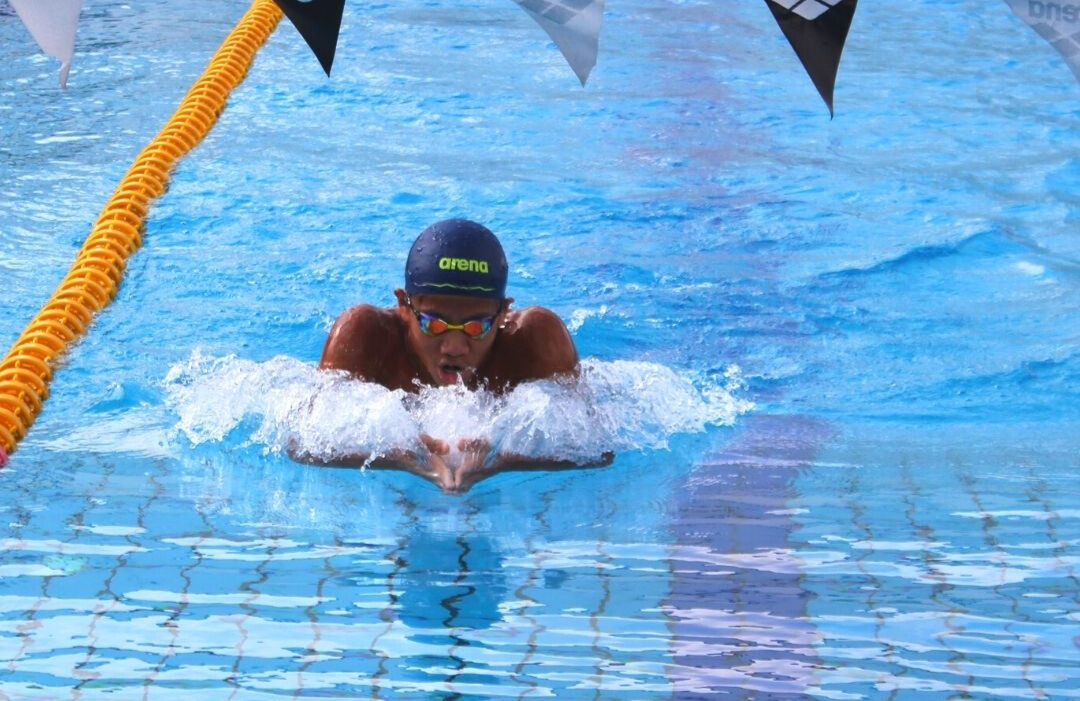Home >
Life at Repton >
#ReptonReflections >
Blog Post #8
Blog Post #8
The Transformative Power of Swimming.
By Mr Kalischer, Head of Physical Education and Sport

Swimming is not just a recreational activity; it is a life skill that offers numerous benefits to young people. Whether it's gliding through the water with graceful strokes or simply splashing around in a pool, swimming holds immense value for the physical, mental, and emotional well-being of young individuals.
Swimming provides a full-body workout, engaging muscles from top to toe. The resistance of the water adds an extra challenge, making each movement more demanding and effective. This gentle resistance helps to build and tone muscles, making swimming an excellent form of exercise for developing strength and flexibility. Moreover, swimming is a low-impact activity that puts minimal stress on joints, reducing the risk of injuries compared to other sports and activities.
Swimming is also a fantastic aerobic exercise. It gets the heart rate up, promoting cardiovascular fitness and endurance. Regular swimming sessions can improve lung capacity and overall respiratory health. By working multiple muscle groups simultaneously, swimming improves coordination, balance, and body awareness, giving young people a greater sense of control and confidence in their own bodies.
In addition to the physical benefits, swimming also has a profound impact on mental well-being. The rhythmic movements of swimming have a calming effect on the mind, reducing stress and anxiety. Being in the water creates a peaceful environment, providing young people with a break from the hustle and bustle of everyday life. Swimming allows them to escape, relax, and focus solely on their own thoughts. It is also a great way to disconnect from screens and technology, encouraging a healthier and more balanced lifestyle.
Furthermore, swimming fosters a sense of achievement and self-belief. As young swimmers develop their skills and gradually increase their distances, they develop a strong sense of accomplishment. Overcoming challenges and reaching goals in the water also translates into other aspects of life, boosting young people's self-esteem and resilience. Additionally, swimming often takes place in a social setting, providing opportunities for young people to interact with others and develop important social skills such as teamwork and communication.
Swimming is a life skill that can save lives. Whether it's for recreational purposes, water sports, or emergencies, knowing how to swim is essential for personal safety. Drowning is one of the leading causes of accidental deaths among young people, and swimming lessons equip them with the knowledge and skills to navigate water safely. Learning to swim at a young age means they can enjoy water-based activities throughout their lives, reducing the risk of water-related accidents.
In summary, swimming offers numerous benefits for young people. It provides a full-body workout, improves cardiovascular fitness, and enhances strength, flexibility, coordination, and balance. Swimming has a positive impact on mental well-being, promoting relaxation and reducing stress and anxiety. It also fosters a sense of achievement, self-belief, and social skills. Most importantly, swimming is a life skill that ensures young people's safety in and around water.
So, dive in and make a splash – the benefits are endless!

Swimming is not just a recreational activity; it is a life skill that offers numerous benefits to young people. Whether it's gliding through the water with graceful strokes or simply splashing around in a pool, swimming holds immense value for the physical, mental, and emotional well-being of young individuals.
Swimming provides a full-body workout, engaging muscles from top to toe. The resistance of the water adds an extra challenge, making each movement more demanding and effective. This gentle resistance helps to build and tone muscles, making swimming an excellent form of exercise for developing strength and flexibility. Moreover, swimming is a low-impact activity that puts minimal stress on joints, reducing the risk of injuries compared to other sports and activities.
Swimming is also a fantastic aerobic exercise. It gets the heart rate up, promoting cardiovascular fitness and endurance. Regular swimming sessions can improve lung capacity and overall respiratory health. By working multiple muscle groups simultaneously, swimming improves coordination, balance, and body awareness, giving young people a greater sense of control and confidence in their own bodies.
In addition to the physical benefits, swimming also has a profound impact on mental well-being. The rhythmic movements of swimming have a calming effect on the mind, reducing stress and anxiety. Being in the water creates a peaceful environment, providing young people with a break from the hustle and bustle of everyday life. Swimming allows them to escape, relax, and focus solely on their own thoughts. It is also a great way to disconnect from screens and technology, encouraging a healthier and more balanced lifestyle.
Furthermore, swimming fosters a sense of achievement and self-belief. As young swimmers develop their skills and gradually increase their distances, they develop a strong sense of accomplishment. Overcoming challenges and reaching goals in the water also translates into other aspects of life, boosting young people's self-esteem and resilience. Additionally, swimming often takes place in a social setting, providing opportunities for young people to interact with others and develop important social skills such as teamwork and communication.
Swimming is a life skill that can save lives. Whether it's for recreational purposes, water sports, or emergencies, knowing how to swim is essential for personal safety. Drowning is one of the leading causes of accidental deaths among young people, and swimming lessons equip them with the knowledge and skills to navigate water safely. Learning to swim at a young age means they can enjoy water-based activities throughout their lives, reducing the risk of water-related accidents.
In summary, swimming offers numerous benefits for young people. It provides a full-body workout, improves cardiovascular fitness, and enhances strength, flexibility, coordination, and balance. Swimming has a positive impact on mental well-being, promoting relaxation and reducing stress and anxiety. It also fosters a sense of achievement, self-belief, and social skills. Most importantly, swimming is a life skill that ensures young people's safety in and around water.
So, dive in and make a splash – the benefits are endless!

